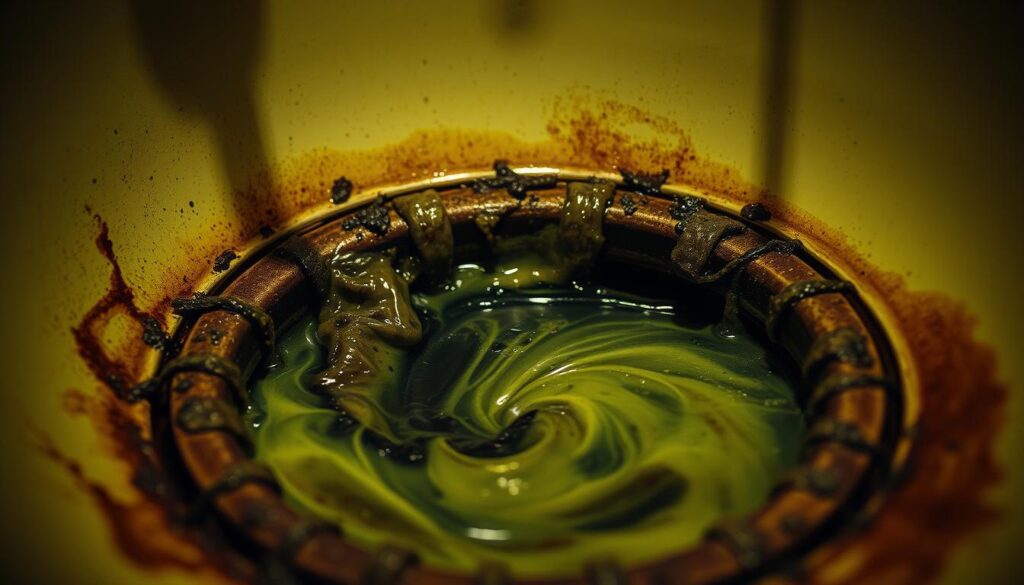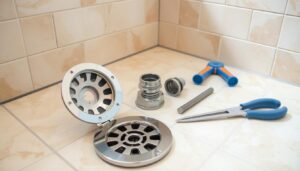Are you tired of being greeted by unpleasant smells every time you turn on your kitchen or bathroom sink? Unpleasant drain odours can make your home feel uncomfortable and uninviting.
The issue of smelly drains is more than just a nuisance; it’s a sign of a potential problem that requires attention. If left unaddressed, drain odours can lead to more serious plumbing issues that are costly and inconvenient to fix.
Fortunately, there are effective solutions for both kitchen and bathroom drains that can be implemented using common household items. Regular maintenance can also prevent smelly drains from returning, ensuring your home remains fresh and clean.
Key Takeaways
- Understand the common causes of smelly drain odours in your home.
- Learn effective DIY methods to eliminate drain odours using household items.
- Discover when it’s necessary to seek professional plumbing help.
- Implement regular maintenance to prevent future drain odour problems.
- Explore comprehensive solutions for both kitchen and bathroom drains.
Understanding the Causes of Smelly Drain Odours
Smelly drain odours can be a nuisance, but understanding their causes is the first step to eliminating them. When you experience a bad smell from your drain, it’s often a sign of an underlying issue that needs attention.
Food Debris and Waste
When plates with food are not scraped off properly before being washed in the kitchen sink, the leftover pieces can accumulate in the pipes underneath. This waste gets trapped by the biofilm in your U-bend, compacts, and results in a blocked sink. As the debris rots, it allows bacteria to thrive, creating a smell.
Fats, Oils, and Grease Buildup
Fats, oils, and grease (FOG) are another common cause of smelly drains. When poured into your drains, they cling to the pipes and eventually solidify, causing blockages that trap other debris and lead to unpleasant odours.
Hair and Soap Scum
In the bathroom, hair sheds during washing and can accumulate in the drains, mixing with soap scum to form stubborn clogs. These clogs can cause water to back up, creating an environment conducive to bacterial growth and smells.
Plumbing System Issues
Sometimes, the issue lies with the plumbing system itself. Missing vents, leaks, or deteriorating pipes can allow sewer gases to enter your home, causing bad smells.
Empty P-Traps and Sewer Gases
An empty P-trap can also be a culprit, as it allows sewer gases to rise into your home. Ensuring that your P-trap is always filled with water is crucial to preventing these gases from causing foul odours.
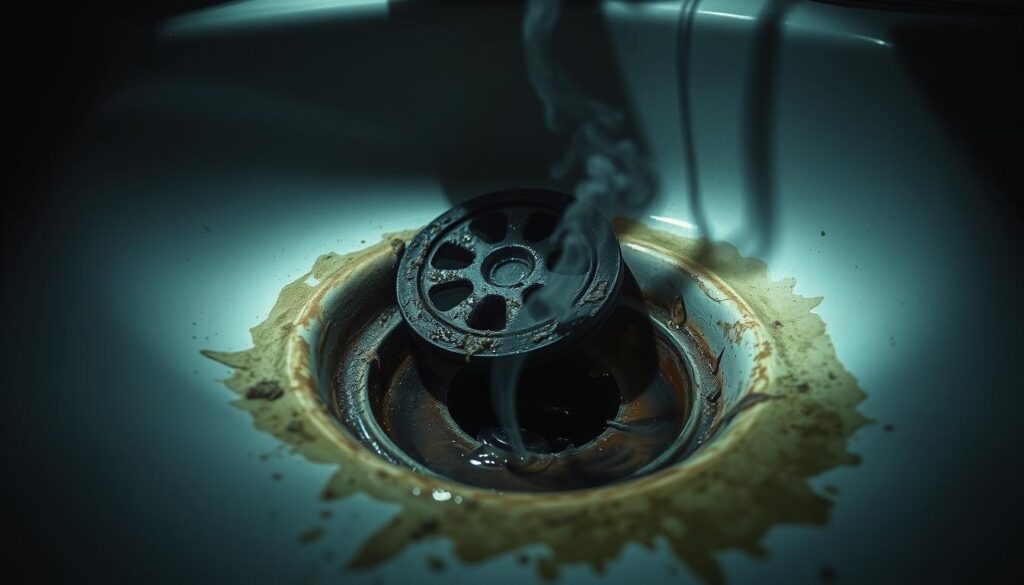
Understanding these causes is key to effectively addressing the problem. Different causes require different treatment approaches, which will be discussed in subsequent sections.
How to Eliminate Smelly Drain Odours in the Kitchen
Smelly kitchen drains can be a real problem, but diagnosing the source is the first step towards a solution. To tackle the issue, you need to understand what’s causing the odour.
Diagnosing the Source of Kitchen Drain Smells
To diagnose the source, check if water is draining slowly or not at all. If so, it’s likely that there’s a blockage in the pipes causing the smell. If the smell is of rotting food, it’s probably due to food debris clogging the drain. A rotten egg smell indicates that sewer gases are escaping through the U-bend.
The Boiling Water Method
One simple method to clear minor grease buildups is the boiling water method. Boil a pan of water, slowly pour it down the plughole, wait five minutes, then run the cold tap to flush through the remaining grease.
Baking Soda and Vinegar Solution
Another effective method is using baking soda and vinegar. Pour half a cup of baking soda down the plughole, followed by one cup of vinegar. Let the solution foam up, then pour hot boiling water down the sink after an hour to flush it through.
Cleaning the P-Trap
The U-bend under the kitchen sink, or “P-trap,” is designed to trap sewer gases. To clean it, remove any accumulated debris. Ensure it’s always full of water to act as a barrier against sewer gases.
Dealing with Garbage Disposal Odours
To eliminate garbage disposal odours, use citrus peels and ice cubes to clean and freshen the disposal unit. This helps remove any food particles causing the smell.
By following these steps, you can effectively eliminate smelly drain odours in your kitchen. Regular maintenance, such as checking your drain and pipes for blockages, can help prevent future issues.
Tackling Bathroom Drain Smells
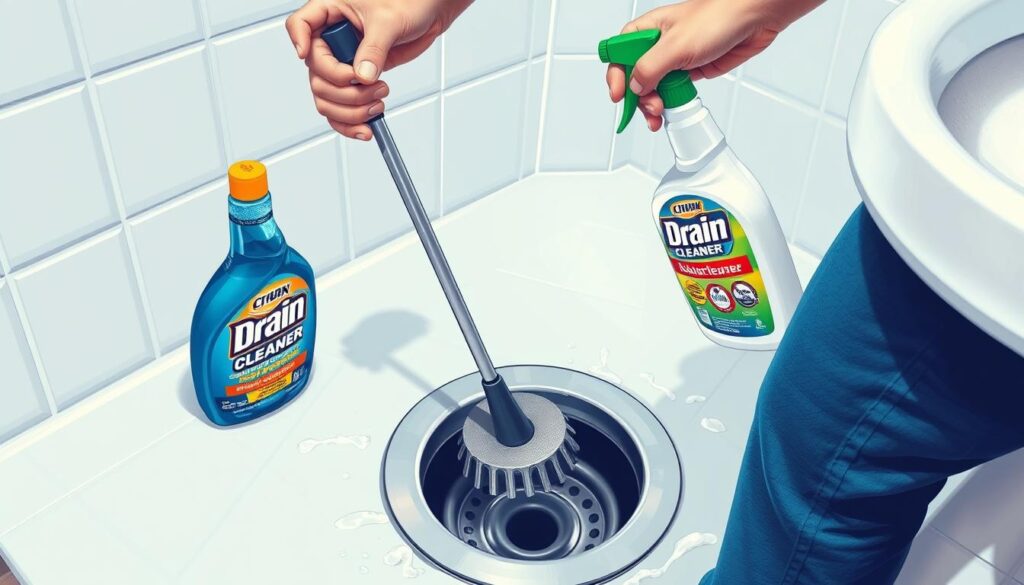
Tackling bathroom drain smells requires understanding their causes and applying the right remedies. Bathroom drains can become smelly due to a buildup of hair, soap scum, and other debris.
Common Causes of Bathroom Drain Odours
Bathroom drain odours are often caused by a combination of hair, soap scum, toothpaste residue, and cosmetic products. These substances can accumulate in the drainpipes and cause unpleasant smells.
Cleaning Hair and Soap Scum Blockages
To clean hair and soap scum blockages, you can use a mixture of baking soda and vinegar. Pour the mixture down the drain and let it sit for a few hours before rinsing with hot water. You can also use a drain snake or plunger to remove any blockages.
Addressing Overflow Pipe Smells
The overflow pipe in your bathroom sink can also be a source of unpleasant odours. To clean it, pour a mixture of white vinegar or bleach down the overflow hole. You can also use a small brush to scrub the inside of the overflow pipe.
Dealing with Shower and Bath Drains
Shower and bath drains are prone to buildup due to the combination of hair, soap, and body oils. To clean these drains, use a drain cleaner or a mixture of baking soda and vinegar. You can also use a drain snake to remove any blockages.
Cleaning the Sink Basin and Surroundings
Sometimes, the cause of the smell may not be in the drain but in the sink basin itself. Clean the sink basin by closing the drain, adding soap and hot water, and scrubbing the sides of the basin. This can help eliminate any odour-causing residue.
Natural Remedies vs. Chemical Solutions
Dealing with smelly drain odours involves choosing between natural remedies and chemical drain cleaners. While chemical solutions might offer a quick fix, they can potentially damage your pipes and create more significant problems in the long run.
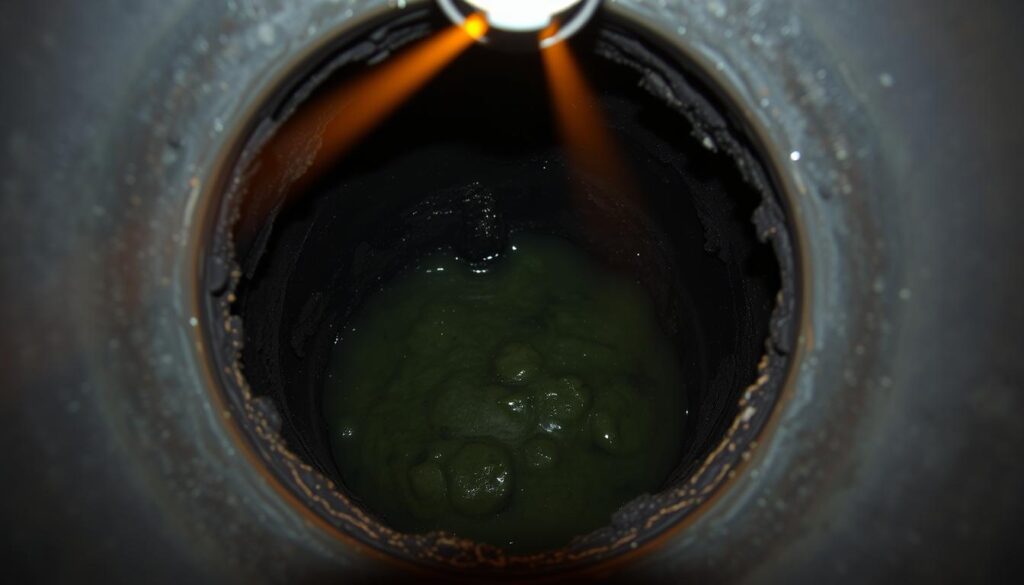
Effective Home Remedies
Natural remedies are a safer, more environmentally friendly option for tackling smelly drains. Two effective methods include using a mixture of vinegar and baking soda and utilizing citrus peels and ice cubes.
Vinegar and Baking Soda
The combination of baking soda and vinegar works by breaking down organic matter and neutralizing odours. Pour 1/2 cup of baking soda down the drain, followed by 1/2 cup of vinegar. Let it sit for a few hours or overnight before rinsing with hot water.
Citrus Peels and Ice Cubes
You can freshen up your kitchen sink drain by tossing in citrus peels and running the garbage disposal. Additionally, running the disposal with ice cubes helps dislodge food chunks stuck to the blades, reducing smell.
Store-Bought Drain Cleaners
For more severe blockages, chemical drain cleaners might be necessary. These products contain active ingredients that dissolve or break down the clog. However, they can also corrode pipes and harm the environment.
Benefits and Limitations
Chemical cleaners can provide a quick solution for tough clogs, but they have limitations. They might not be suitable for all types of drains and can cause damage over time.
Safety Considerations
When using chemical drain cleaners, ensure proper ventilation and wear protective equipment to avoid exposure to harsh chemicals. Always follow the manufacturer’s instructions.
When to Choose Each Method
The choice between natural remedies and chemical solutions depends on the severity of the problem and the type of drain. For minor issues, natural remedies are a safer, more environmentally friendly option. For severe blockages, chemical cleaners might be necessary, but with caution. For more information on maintaining a clean and fresh kitchen, you can visit this page for tips on natural cleaning methods.
Prevention is always better than treatment, regardless of which method you choose. Regular maintenance and being mindful of what goes down your drains can significantly reduce the occurrence of smelly drain odours.
Preventing Future Drain Odours
You can prevent future drain odours by following a few straightforward tips. Regular maintenance is key to keeping your drains smelling fresh.
Regular Maintenance Practices
To maintain your drains, schedule regular checks with a professional plumbing and drainage service. This will help identify potential issues before they become major problems.
Using Drain Screens and Strainers
Placing a drain screen or sink strainer over the plughole can catch food particles in kitchen sinks and hair and soap scum in bathroom sinks, preventing them from entering the plumbing system.
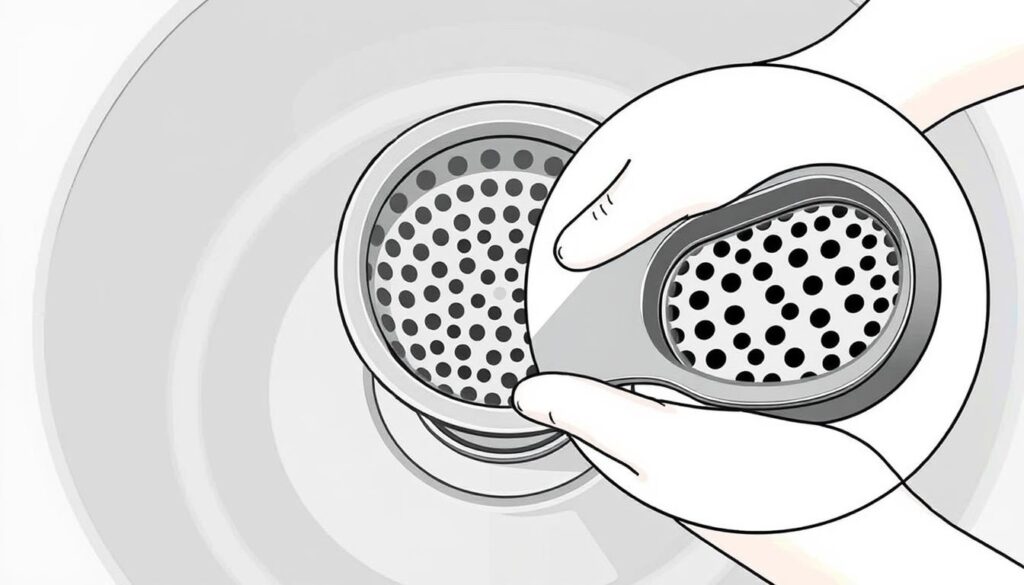
Proper Disposal of Fats and Food Waste
Avoid pouring fats, oils, and grease down kitchen drains. Instead, use kitchen towel to absorb as much of it as possible and dispose of it in a bin before washing up.
Weekly Cleaning Routine
Pour baking soda down your drains at least once a week, followed by hot water. This helps kill off bacteria and keeps your drains clean.
Conclusion
You can say goodbye to smelly drain odours by implementing the right strategies. To recap, we’ve covered the common causes of drain odours, including food debris, grease buildup, and plumbing issues. We’ve also discussed effective solutions for both kitchen and bathroom drains, such as using baking soda and vinegar to clean your drains.
Regular maintenance is key to preventing future drain odours. By incorporating simple practices like using drain screens and strainers, you can keep your drains smelling fresh. If persistent odour issues arise, it may be necessary to call a professional plumber. By maintaining clean and odour-free drains, you’ll enjoy a more pleasant and hygienic home environment.
